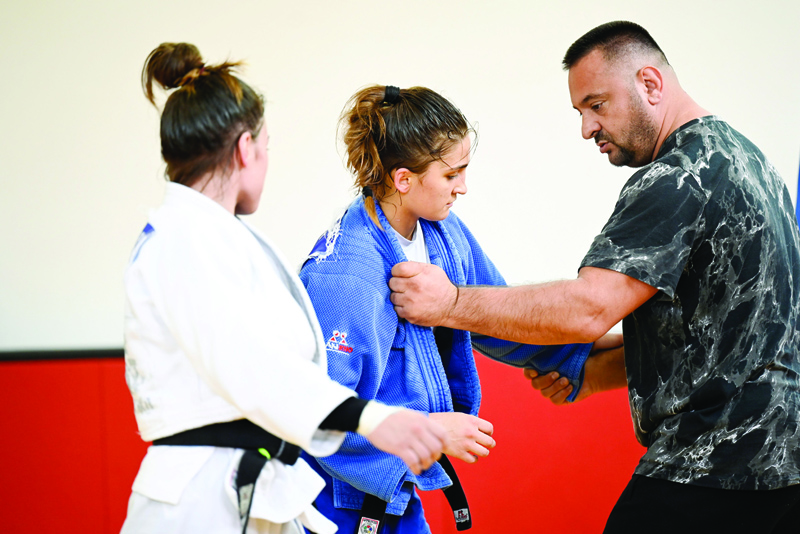 PEJA: Kosovo's Judo trainer Driton Kuka (right) leads a training session at the Ippon judo club in the town of Peja on June 16, 2021. - AFP
PEJA: Kosovo's Judo trainer Driton Kuka (right) leads a training session at the Ippon judo club in the town of Peja on June 16, 2021. - AFPPEJA: Already famous for its local beer, spectacular scenery and Orthodox monastery, a small city in Kosovo has added another feather to its cap: conveyor belt for Olympic talent. Peja, known as Pec to Serbs, on the edge of a mountainous national park with wide canyons and craggy peaks, will supply all five of Kosovo's judo hopefuls at this summer's Tokyo Games.
Among them is Majlinda Kelmendi, who won gold at the 2016 Rio Games -- the only medal Kosovo has ever won, in the only Olympics it has competed in since declaring independence from Serbia in 2008. "Majlinda and other judokas have spread the good name of our country -- no embassy could represent us better," says Driton Agusholli, a telecoms worker from Peja.
Kelmendi's feat sparked a craze for judo in Kosovo, which now has six judo schools, 17 clubs and 1,200 registered judoka, as practitioners are known. But neither the rise of Peja -- a city of less than 100,000 people -- nor Kelmendi's Olympic triumph came without a struggle. The roots of the achievement go back to the implosion of Yugoslavia in the early 1990s, and how this affected one man: judo coach Driton 'Toni' Kuka.
'Treated like heroes'
On the eve of the 1992 Barcelona Olympics, all looked rosy for Kuka -- he was one of the Yugoslav team's hottest prospects and knew he had beaten all his closest rivals in recent competitions. But as Yugoslavia splintered and spiraled into war, Kosovo's athletes withdrew from the squad in protest against extreme Serb nationalist president Slobodan Milosevic.
Kuka was shattered as he watched his judo career wash away in the maelstrom of conflicts that eventually saw NATO bomb Serbia to force its troops out of Kosovo. Back in war-ravaged Peja at the turn of the millennium, Kuka and his two brothers -- also judokas -- had to begin anew. "After the war, I wanted to work with kids and wanted to show the world that Kosovo has great athletes who can win medals," he says.
The brothers could only manage to set up a humble dojo, as judo schools are known, within their home complex. "I had to be coach, nutritionist, psychologist, physiotherapist. We didn't have what we wanted for high-level sport," says Kuka. But the Olympic gold medal changed all that. "Now our team are treated like heroes," he says. "Now we get the medical and financial support we need... Now every big tournament is on national TV. Everyone knows us."
Kuka says the five judoka in the team for Tokyo are in the top 10 of their weight classes and each of them has a great chance of a medal. They also share another important characteristic -- they are all from Asllan Ceshme, the Peja neighborhood where Kuka is based.
'Our best ambassadors'
Kuka is always keen to stress the importance of his neighborhood. "None of the competitors you see here live more than 200 or 300 meters from the dojo," he says, referring to the five Olympic team members. Their success has come from decades of hard work, with Kuka reflecting that his judoka have won all the medals possible -- from regional championships to the Olympics. "This is something I never in my life thought I could do," he says.
While he reflects on past glories and years of hard work, many in Kosovo speak of judo with wide-eyed enthusiasm, like it is a story just beginning. Vjosa Osmani, who was elected president earlier this year, made Kuka and his judo stars the first official guests after her inauguration. She said they had "raised the flag of Kosovo where neither politics nor diplomacy could reach" and described them as "our best ambassadors".
Like Osmani, many in Kosovo see the team not only as sports stars but also as role models, flag-bearers and figures of adoration. "The whole world likes them," says Selvije Ademaj, a housewife from Peja. "They can serve as an example to young people of how to make the world respect you." - AFP









